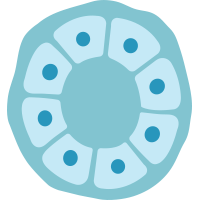
Mammary Cell News
Mammary Cell News is an online resource covering the latest research into breast cancer and mammary cells.
UFL1 Triggers Replication Fork Degradation by MRE11 in BRCA1/2-Deficient Cells
[Nature Chemical Biology] Investigators identified UFL1, a UFM1-specific E3 ligase, as a pivotal regulator of fork stability and the response to PARP inhibitors in BRCA1/2-deficient cells.
Global Breast Cancer Report Finds Inequities Persist
[National Institute for Health and Care Research] A new Lancet Commission sets out recommendations to tackle urgent global challenges in breast cancer. Supported by the National Institute for Health and Care Research, the commission reveals that despite significant improvements inequities persist.
Physiological DNA Damage Promotes Functional Endoreplication of Mammary Gland Alveolar Cells During Lactation
[Nature Communications] Researchers showed that DNA damage accumulates due to replication stress during pregnancy, activating the DNA damage response. Modulation of DNA damage levels in vivo by intraductal injections of nucleosides or DNA damaging agents reveals that the degree of DNA damage accumulated during pregnancy governs endoreplication and milk production.
Epigenetic Deregulation in Breast Cancer Microenvironment: Implications for Tumor Progression and Therapeutic Strategies
[Biomedicine & Pharmacotherapy] Scientists delve into the complex connections between breast cancer treatment response, underlying epigenetic changes, and vital interactions within the tumor microenvironment.
CDK7 in Breast Cancer: Mechanisms of Action and Therapeutic Potential
[Cell Communication And Signaling] Scientists delineated the biological roles of CDK7 and explicates the molecular pathways through which CDK7 exacerbates the oncogenic progression of breast cancer.
ANXA9 Facilitates S100A4 and Promotes Breast Cancer Progression through Modulating STAT3 Pathway
[Cell Death Discovery] Researchers found highly expressed ANXA9 in metastatic breast cancer tissues, which is correlated with breast cancer progression. In vitro, the functional experiments indicated ANXA9 influenced breast cancer proliferation, motility, invasion, and apoptosis
IRX4204 Induces Senescence and Cell Death in HER2-positive Breast Cancer and Synergizes with Anti-HER2 Therapy
[Clinical Cancer Research] The authors examine the efficacy of IRX4204, a highly specific rexinoid, in breast cancer cell lines and preclinical models to identify a biomarker for response and potential mechanism of action.
Tumor Biomechanics Alters Metastatic Dissemination of Triple Negative Breast Cancer via Rewiring Fatty Acid Metabolism
[Advanced Science] Using mechanically tuneable model systems, mimicking the range of stiffness's typically found within breast tumors, it was found that, contrary to expectations, cancer cells exposed to softer microenvironments were more able to colonize secondary tissues.
FGFR4-Driven Plasticity in Breast Cancer Progression and Resistance to Therapy
[British Journal Of Cancer] The authors summarize the role of FGFR4 in breast cancer, with a special focus on its contribution to subtype switching during metastatic spread and/or induced by therapy.
The PML1-WDR5 Axis Regulates H3K4me3 Marks and Promotes Stemness of Estrogen Receptor-Positive Breast Cancer
[Cell Death & Differentiation] The authors discovered that PML1 is the most abundant isoform in all breast cancer subtypes, and its expression is associated with unfavorable prognosis in estrogen receptor-positive breast cancers.
Overcoming BRAF and CDK4/6 Inhibitor Resistance by Inhibiting MAP3K3-Dependent Protection Against YAP Lysosomal Degradation
[Experimental & Molecular Medicine] Researchers identified MAP3K3 as a target for overcoming anticancer drug resistance. Depletion of MAP3K3 led to a substantial reduction in the yes-associated protein (YAP) protein level in melanoma and breast cancer cells.
Atossa Therapeutics and Quantum Leap Healthcare Announce I-SPY 2 Clinical Trial To Evaluate (Z)-Endoxifen in Combination With Abemaciclib (VERZENIO®) in Women With ER+/HER2- Breast...
[Atossa Therapeutics, Inc.] Atossa Therapeutics, Inc. and Quantum Leap Healthcare Collaborative™ announced the initiation of a new study to evaluate Atossa’s (Z)-endoxifen in combination with abemaciclib, a cyclin-dependent kinase inhibitor marketed by Eli Lilly and Company, in women with ER+/HER2- breast cancer.
For over a decade, Mammary Cell News has been keeping the global scientific and medical communities informed about the latest research, reviews, and news in the field of mammary tissues. Our editors gather publications on the topic of mammary cell differentiation and characterization, as well as the progression and treatment of breast cancer. We also keep scientists up-to-date on the latest policy changes, job postings, and events.

 Cancer Stem Cell News
Cancer Stem Cell News Cell Therapy News
Cell Therapy News Dermal Cell News
Dermal Cell News Endothelial Cell News
Endothelial Cell News ESC & iPSC News
ESC & iPSC News Extracellular Matrix News
Extracellular Matrix News Hematopoiesis News
Hematopoiesis News Hepatic Cell News
Hepatic Cell News Human Immunology News
Human Immunology News Immune Regulation News
Immune Regulation News
 Intestinal Cell News
Intestinal Cell News Mammary Cell News
Mammary Cell News Mesenchymal Cell News
Mesenchymal Cell News Muscle Cell News
Muscle Cell News Neural Cell News
Neural Cell News Organoid News
Organoid News Pancreatic Cell News
Pancreatic Cell News Prostate Cell News
Prostate Cell News Pulmonary Cell News
Pulmonary Cell News
